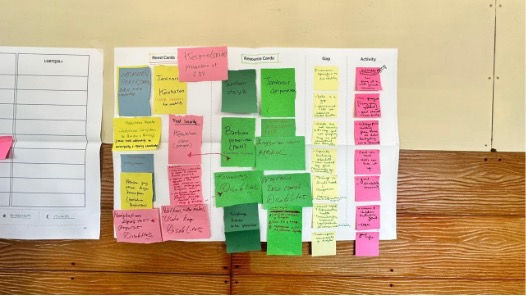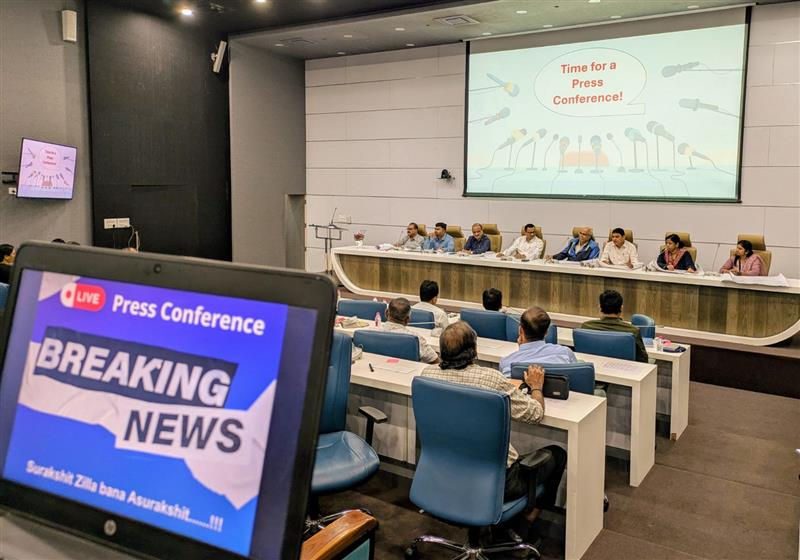
All Projects

Bangladesh
Nurturing Resilience from the Ground Up: The Safer Communities Innovation Lab
The Safer Communities Innovation Lab, part of a DFID-Start Network and CDAC supported Disasters and Emergencies Preparedness Programme (DEPP) Labs programme co-established by STS, identified and supported community-led innovations to reduce disaster risk. Based in Korail, Bangladesh’s largest informal settlement, the initiative moved beyond innovation buzzwords to empower vulnerable communities. It provided small grants and a supportive ecosystem, co-creating a vital community space that served as a hub for collaboration. The lab helped develop and refine hyper-local solutions such as green walls for cooling, mobile-based community radio, and a network of emergency-trained pharmacists. Through iterative mentoring, these community-led ideas matured into practical, scalable innovations. STS connected innovators with government and development organisations to sustain and scale impact, strengthening broader resilience ecosystems through complementary research and capacity building. The project was led in partnership with Dhaka Community Health Trust (DCH), University of New South Wales (UNSW), Centre for Research on the Epidemiology of Disasters (CRED) at the University of Louvain, and the Asian NGO network ADRRN.

Odisha, India
Vulnerability Mapping for Climate Resilience in Puri, Odisha
In collaboration with Selco Foundation, we assessed climate vulnerabilities and livelihood risks for low-income communities in Puri, Odisha. Using a mix of GIS mapping, literature review, and on-the-ground surveys, the study identified how cyclones, floods, and heatwaves threaten lives, homes, and incomes. A participatory methodology spotlighted five highly vulnerable communities, integrating gender, age, and disability dimensions. Local voices gathered through focus groups informed an inclusive, evidence-based adaptation strategy, emphasising community empowerment and policy reform to safeguard Puri's most at-risk residents.

Bihar and Gurugram, Haryana
Hyperlocal Air Quality Intelligence for Regulatory Action
For the Hyperlocal Mapping of Air Pollution project with UNDP (Climate & Energy Lacuna Fund), we deployed IoT sensors and AI-driven predictive modelling to generate precise, actionable data. This intelligence supported the development of use-case scenarios for implementing targeted regulatory actions and cost-effective pollution management strategies for State Pollution Control Boards and Development Authorities in Bihar and Gurugram, Haryana.

India
Roadmap for Transformative Change: A Decadal Corporate Social Responsibility Strategy
Our partnership with the InterGlobe Foundation (IGF) is co-creating a 10-year strategic roadmap to guide its CSR investments toward sustained, high-impact outcomes. Anchored in procedural humility, the process centres on deep listening to communities and local stakeholders to surface priorities that reflect lived realities. This co-creation ensures interventions are contextually grounded and community-led. The roadmap identifies areas where patient, long-term capital can unlock transformative social impact across themes like heritage conservation, environmental stewardship, and livelihood resilience.

Indonesia
Leading with Lived Experience: Inclusive Evacuation in Indonesia
In Indonesia’s disaster-prone Mount Merapi region, we supported Yakkum Emergency Unit (YEU) and CIQAL to develop an inclusive disaster preparedness model. This innovation directly addressed the exclusion of persons with disabilities (PWDs) by creating a real-time database, a community-owned evacuation SOP, and a local advocacy group. Unique for its leadership by PWDs, the system ensured solutions reflected lived experience. With CLIP mentoring, the project explored scaling pathways—from integration into local governance to replication in neighbouring villages—anchored in procedural humility and sustainable community ownership.

Indore, Bhopal and Jabalpur, India
Catalyzing Urban Impact: Investment Strategies for Systemic Change
In collaboration with the HT Parekh Foundation, we conducted in-depth city-level studies to formulate impact investment strategies for urban India. Focusing on heat resilience, waste management, and water systems, our approach combined infrastructure readiness assessments, governance analysis, and community vulnerability mapping. This multi-faceted evaluation identified where philanthropic capital could be most catalytic, particularly in underserved and high-risk urban zones, guiding investments toward high social return and equitable development.

Maharashtra, India
Embedding Inclusion into Disaster Governance: Multi-Hazard Plans for Maharashtra
Working with district authorities supported by UNDP, we developed comprehensive District Departmental Disaster Management Plans (DDDMPs) for 16 departments across Pune and Raigad. These data-driven plans address unique multi-hazard risks—from industrial accidents to flash floods—through an inclusive lens. A core commitment to "leave no one behind" integrated the specific needs of women, children, the elderly, persons with disabilities, LGBTQIA+, and tribal communities. Through risk mapping and simulation exercises, we empowered officials to test protocols and strengthen inter-departmental coordination, creating replicable models for resilient local governance.

Global
Rethinking Scale: A Community-Led Framework for Innovation
Innovation scaling requires a radical departure from traditional models. Through the Community-Led Innovation Partnership (CLIP), we championed an approach rooted in the agency and aspirations of communities themselves. Moving beyond mere geographic expansion, we co-designed a framework defining scale from a community perspective: as impact depth, ownership transfer, and systemic embedding. This was supported by nine practical scaling attributes, hands-on tools, and training modules to help local actors sustain change. The strategies were successfully applied and tested with partners like CDP in the Philippines, YEU in Indonesia, CAFOD in South Sudan, and ASECSA in Guatemala.

India, Bangladesh, Nepal
Climate Migration: Stories of humans and homes
This research project focuses on climate-impacted populations displaced to cities, where they settle in informal housing, facing increased vulnerabilities. The project aims to map these vulnerabilities using housing inadequacy as an indicator and develop risk reduction strategies. Key activities include creating and testing a risk assessment tool, scaling risk reduction models, vulnerability measurement, and engaging in policy advocacy. The goal is to reduce disaster risks for displaced families, particularly women and girls, through locally-driven actions.

Multiple Locations in India
Climate Smart Governance: Trainings for Government Officials
The aim of this project was to provide government officials training on climate change issues, adaptation needs and possibilities. The broad themes for this capacity building included impacts on water resources, agriculture and human health, as well as disaster risk reduction (DRR) and mitigation strategies.

Multiple Locations in India
Capacity Building Strategies for Managing Complex Disasters
This project aimed to assess the vulnerability of cities and communities to complex disasters in the face of climate change. The project adopted a bottom-up approach focusing on multiple stakeholders at all levels including government officials, PRI representatives, schoolteachers, and community members.

Nepal
Resilient Housing Reconstruction
The 2015 Gorkha earthquake was the worst disaster to strike Nepal in 80 years. We were one of four organizations that formed the Owner Driven Reconstruction Collaborative (ODRC), responsible for the reconstruction of 26,912 houses. We provided socio-technical facilitation services in 6 rural and 2 urban municipalities, with a focus on construction technology and design.

Odisha, India
Cyclone Fani Response
This project aimed to build resilience and provide relief after Cyclone Fani caused heavy losses to the coastal communities of Odisha. Mobilizing the fishing community (led by the fisherwomen) and making them the vehicles for delivery was the focus. Differential impact on houses and public infrastructure was studied, and plans were formulated for future resilience.

India
COVID-19 Response
Guidelines were prepared for converting public buildings into isolation wards, operations and maintenance, lockdown protocols and first responder training. The guidelines were formulated in line with National Center for Disease Control (NCDC) and climate factors such as building orientation and roof insulation for different climatic zones were considered.

Assam, India
Design of Climate Resilient Villages
This project developed approaches to address water-related risks in Assam, particularly floods and erosion along the Brahmaputra, Beki and Buri Dhing rivers. A framework for climate resilience of over 100 vulnerable villages along with implementation plans were formulated. Both were carried out through a participatory approach, in line with existing policies and plans.

Bihar, India
City Disaster Management Plans
Tourist sites by definition have many visitors. As such, if a disaster strikes, the impact is far greater in terms of property and lives lost. The cities of Gaya and Bihar Sharif are gateways to the tourist sites of Bodh Gaya and Nalanda respectively. We prepared comprehensive disaster management plans for both cities, including an AI-assisted risk model that was run in Gaya.

New Delhi, India
Climate Smart Cities
Monitoring the progress of programs is sometimes as important as the program itself. The Climate Smart Cities Assessment Framework was launched by the Ministry of Housing and Urban Affairs under its Smart Cities Mission to capture the progress made by cities in the preceding year. Case studies on local climate action and community interventions were prepared in this project.

Bihar, India
Eco-based DRR
The decline of wetlands reduces resilience against water-related hazards such as floods and droughts. Using wetlands as natural infrastructure for disaster risk reduction (DRR) can go a long way in mitigating hazards and bolstering resilience of local communities. In this project, we worked to restore wetlands in Kanwar basin, Bihar.

New Delhi, India
Delhi Climate Action Plan
In this project, we assisted the Delhi Government in conducting its first ever Green House Gas inventory and setting a clear pathway to a net zero goal. We also worked on a robust adaption plan for unavoidable, increasing climate impacts and disaster risks. The processes focused on detailed studies and extensive stakeholder consultations to arrive at an actionable strategy.

Srinagar, Jammu and Kashmir, India
Disaster Management Plan for Indian Railways
The railway line connecting Kashmir to the rest of India is a project of national importance. Navigating tough terrain, it comprises longer tunnels and higher bridges than have ever been built in the area. A comprehensive disaster management plan for such a line is unprecedented. The plan analyzes hazards and lays down protocols for reducing risk and taking emergency action.

Assam, India
Climate Change Loss Reduction Framework
This action research explored the improvement of system efficiency through community actions and frontline health worker effectiveness during COVID in NE India. Nudges that improve catalytic actions in small ways can improve outcomes significantly. The findings of the project showed ways to create high levels of social impact in community resilience through strategic actions.

Thiruvananthapuram, Kerala, India
Virtual Cadre Disaster Management Training
The Virtual Cadre is a unique and effective governance mechanism in Kerala wherein identified office-bearers across state departments constitute a multi-sectoral team of disaster managers. This ensures better inter-departmental coordination, which has been an elusive goal of disaster management approaches. The focus was on training and capacity building of the Virtual Cadre.

New Delhi, India
Women Led Climate Change Adaptation
Extreme heat disproportionately affects urban low-income families. Cities are hotter than the countryside, and slums are hotter than other parts of cities. The project demonstrated how women can mobilize, understand weather risks and lead frugal interventions such as cool roofs and street shading that are easily adopted, making their spaces safer from heat-related risks.

New Delhi, India
Humanitarian Innovation for Resilience
Local communities possess valuable traditional wisdom on ways to address their risks. They constantly come up with creative ways to solve their problems. This approach to innovation complements technology and governance to improve the efficiency of humanitarian action. The project identifies and supports such innovations across geographies and co-creates pathways to scale them.

Noida, Uttar Pradesh, India
Prototyping & Testing of Shelter Systems
Prefabricated emergency shelters are the global standard and fastest way to put a roof over displaced, homeless families after a disaster. However, a one-size-fits-all approach has been adopted thus far. This project customizes such shelters to local cultural and climatological contexts, tapping into local skills, techniques and materials.

Multiple Locations in India
Developing & Piloting CIS Systems
Weather warnings and climate forecasts are usually too complex for end users such as farmers and citizens to fully understand and act upon. Additionally, information is often received from weather stations far away. This project targeted the collection and analysis of local weather data, improving both the understanding of risks and the actions that should be taken as a result.

Multiple Locations in India
Climate Resilient Livelihood Needs Assessment
Climate change is adversely impacting livelihoods across sectors and geographies. An overview of climate impacts, key sector insights, and nuances of how communities face downstream effects was synthesized to help identify priorities for resource allocation. This was done for vulnerable districts to inform our client's social impact investment priorities.